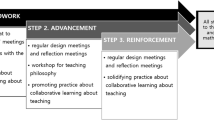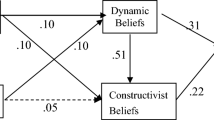Abstract
This study investigates US teachers’ cultural beliefs concerning effective mathematics teaching using semi-structured interviews with 11 experienced teachers. For US teachers, effective teaching is student-centered. Cognitively appropriate mathematical content should be understood through many hands-on activities that allow students to explore by themselves the relationship between mathematical knowledge and their life experiences. Correspondingly, the US teachers view an effective teacher as a facilitator who is sensitive to student social and cognitive needs and is skillful at organizing collaborative learning. The result of this study helps researchers and educators understand the student-centered learning model in US classrooms.
Similar content being viewed by others
References
Cai J. (2004). Why do US and Chinese students think differently in mathematical problem solving? Exploring the impact of early algebra learning and teachers’ beliefs. Journal of Mathematical Behavior, 23, 135–167.
Cai, J., & Wang, T. (2006). US and Chinese teachers’ conceptions and constructions of representations: a case of proportional reasoning. International Journal of Science and Mathematics Education, 4, 145–186.
Ernest, P. (1989). The impact of beliefs on the teaching of mathematics. In P. Ernest (Ed.), Mathematics teaching: the state of the art (pp. 249–254). New York: The Flamer Press.
Marton, F., Tse, L. K., & dall’Alba, G. (1996). Memorizing and understanding: the keys to the paradox? In D. A. Watkins, & J. B. Biggs (Eds.), The Chinese learner: cultural, psychological and contextual influences (pp. 69–83). Hong Kong: Comparative Education Research Centre, The University of Hong Kong and Melbourne, Australia: The Australian Council for Educational Research.
National Research Council (1989). Everybody counts. Washington, DC: National Academy of Sciences.
National Council of Teachers of Mathematics. (1989). Curriculum and evaluation standards for school mathematics. Reston, VA: NCTM.
National Council of Teachers of Mathematics. (1991). Professional Standards for Teaching Mathematics. Reston, VA: NCTM.
National Council of Teachers of Mathematics. (2000). Principles and standards for school mathematics. Reston, VA: NCTM.
Robeck, E. C. (1997). United States. In D. F. Robitaille (Ed.), National contexts for mathematics and science education: an encyclopedia of the education systems participating in TIMSS. Vancouver, Canada: Pacific Educational Press.
Senk, S. L., & Thompson, D. R. (Eds.) (2003). Standards-based school mathematics curricula: what are they? What do students learn? Mahwah, NJ: Lawrence Erlbaum Associates.
Skemp, R. R. (1978). Relational understanding and instrumental understanding. Arithmetic Teacher, 26(3), 9–15.
Thompson, A. G. (1992). Teachers’ beliefs and conceptions: a synthesis of the research. In D. A. Grouws (Ed.), Handbook of research on mathematics teaching and learning (pp. 127–146). NY: Macmillan.
Vygotsky, L. S. (1978). Mind in society. Cambridge, Massachusetts: Harvard University Press.
Wang, T., & Cai, J. (2007). Chinese (Mainland) teachers’ views of effective mathematics teaching and learning (in this special issue).
Acknowledgments
The research discussed in this paper was supported by grants from the Spencer Foundation. Any opinions expressed herein are those of the authors and do not necessarily represent the views of the Spencer Foundation. We gratefully acknowledge the valuable assistance of Vic Cifarelli for data collection.
Author information
Authors and Affiliations
Corresponding author
Rights and permissions
About this article
Cite this article
Wang, T., Cai, J. United States teachers’ views of effective mathematics teaching and learning. ZDM Mathematics Education 39, 315–327 (2007). https://doi.org/10.1007/s11858-007-0031-6
Accepted:
Published:
Issue Date:
DOI: https://doi.org/10.1007/s11858-007-0031-6




